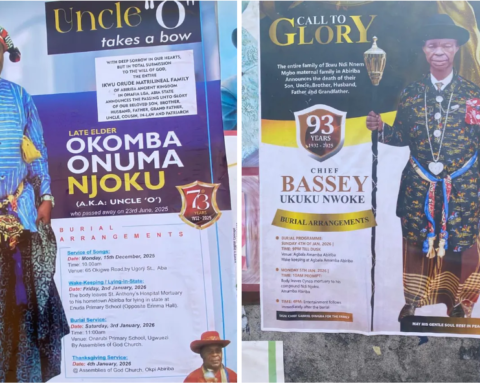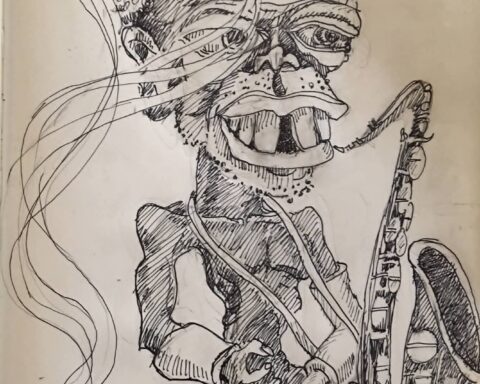Ekiti State in Southwest Nigeria is one of those states that literally shy away from the limelight. The last time Ekiti was in the news, I think, was in the days of Governor Ayodele Fayose when he propounded the theory of “Stomach Infrastructure.” It was his way of explaining the proclivity of poor, rural voters to sell their votes to the highest bidders during elections instead of using them to install good leaders . Today, Ekiti is back in the news: Two of its illustrious sons are locked in an existential battle for the soul of Nigeria.
In the blue corner is Dele Farotimi, the fearless and grandiloquent lawyer, who has earned for himself a name as a social critic, spokesperson of the Obidient movement, and social media darling of those who despise the Nigerian establishment. In the past one week, Dele has been a guest of the Nigeria Correctional Services in Ado Ekiti. There, he is not luxuriating in an executive NCS guest house or eating iyan (pounded yam) and Bushmeat for lunch. Nor is he visiting the prisons to render free legal services to indigent detainees. Quite on the contrary, Mr. Farotimi is himself an inmate, “smelling the iron rods” of detention, inhaling the stench of urine and fecal matter commonly associated with Nigerian detention centers. Just like a common criminal.
In the red corner is someone who needs no introduction, at least around Nigeria. Chief (Aare) Afe Babalola is a nonagenarian doyen of legal practice and Senior Advocate of Nigeria. He also happens to be the founder of one of Nigeria’s elite private universities, Afe Babalola University, Ado-Ekiti (ABUAD). Chief Babalola is suing Mr. Farotimi for “Criminal Defamation” over the content of the latter’s book, “Nigeria and it’s Criminal Justice System,” published in June 2024.
Ordinarily, this should be an epic legal battle between David and Goliath. Like the Biblical story, the outcome of the Battle of Ekiti is far from predictable. Farotimi is a brilliant lawyer with the conscience of a rebel and the tongue of a social crusader. Babalola is a legal Colossus with the reputation of a ruthless warrior who fights almost exclusively for the Kings and their henchmen. Both men are separated by nearly 40 years in age.
The police is usually not a party to defamation disputes, especially between two well-informed lawyers. In the case of Babalola vs. Farotimi however, the Nigeria Police is embedded as a principal actor. Mr. Farotimi alleges that he was abducted in Lagos by men of the Nigeria Police (Ekiti State Command), forcibly taken to Ekiti (far away from where the alleged offence was committed), detained over a few days, and arraigned in court the following week, in handcuffs. All this without being duly served a summon or court notice. All this without legal representation. All this, he claims, at the instance of Chief Afe Babalola.
Even in the worst days of colonial rule or military dictatorship, this series of events, if proven, would have eminently qualified as an outrage. In a democracy and a “federal republic,” it looks like a classic act of impunity, disrespect for citizen rights, abuse of privilege and public office, and flagrant disregard of due process.
It would be interesting to know who bankrolled the trip for the police officers who travelled from Ekiti to Lagos and back like bounty hunters in an old cowboy movie. Especially given that the Nigeria Police hardly ever has money to fuel its vehicles for local distress calls. If Farotimi’s capture passes the Litmus Test it must now undergo, we will have a new template for impunity and vendetta across Nigeria.
I am now seriously considering getting law enforcement to go after some of my “enemies” back in my village. You see, I have some lingering land disputes with those folks. It would be nice to bring them to trial in the city where they are completely out of their depths. And where, hopefully, I have a little gravitas to swing proceedings my way. That should teach those treacherous bastards a lesson, don’t you think?
In my limited experience as a journalist, defamation is almost universally a civil (not a criminal) matter. That means, an aggrieved party may simply approach a court to file a suit; the accused is served a court notice and invited to file his response or defense; from the comfort of their homes, both parties appear before a Judge who hears the case until judgment is reached. If defamation is treated as a “criminal offence” anywhere, it is almost certainly the residue of colonial law retained by local tyrants to deal with potential enemies. Is Ekiti one of those tyrant enclaves? Does that help explain why Lagos was sidestepped as preferred venue for this epic fight?
In this case, strangely, it appears that one side has decided that the other side must respond to legal charges from the “comfort” of police and prison cells, and in utmost humiliation. Reminds me of the story of the federal legislator who was recently captured on video threatening a deliveryman that, “I will make you disappear and nothing will happen.” Our democracy is evolving in interesting ways.
Police arrest and detention are commonly used in criminal cases where the accused is likely to attempt to escape trial, tamper with evidence or endanger witnesses. It usually has no place in civil litigations like defamation because no respondent in his right mind, especially a lawyer, is expected to attempt to escape justice even before having his day in court. Nor is there evidence to be tampered with by the respondent since the material evidence for defamation is already in the public domain.
Quite clearly, the Nigeria Police has been drawn into this case as an interested party for yet unknown reasons. By travelling across state borders to nab a man and forcibly ferry him hundreds of kilometers away, ostensibly to face justice, the police has technically taken sides in the matter. It has also now commenced punishment before trial. Or is it trial by ordeal?
If Mr. Farotimi sues, as I trust he will, he could claiming significant damages. The Nigerian state is already bugged down by large judgment debts arising from the indiscretion of overzealous, ignorant or compromised state officials.
In a sense, I am glad it was Dele Farotimi who was picked up for this trial. Those who picked him up will meet their match. Mr. Farotimi is not just a lawyer but a fiery one. He will not let this indignity slide. His entire career and reputation now rests on it. He is well equipped to scrutinize every move by his traducers. Any wrong step will be amplified, litigated and hopefully adjudicated. This promises to be a long, drawn-out war with many battles and skirmishes. Hopefully, our society and jurisprudence will be the better for it.
In all of this, it is becoming increasingly unclear who really is on trial here. Is it just Mr. Dele Farotimi who is in the docks of the Ekiti State judiciary? I have my doubts. More people are stepping forward who say they are ready to testify against Chief Babalola and in support of Mr. Farotimi’s claim that the grand old man is in the habit of compromising the institutions of state and bypassing the rule of law. I have just finished reading of another lawyer who has a grudge against the titan for (allegedly) using the police, in a strikingly similar way, to “settle” a family dispute involving one if his lecturers at ABUAD and the lecturer’s estranged wife. The lawyer claims this happened just last year, 2023.
So, Pa Babalola’s quest for redemption from alleged defamation may not go entirely as anticipated. Not to mention that the bar association and civil rights community are both irate and split down the middle in this matter – especially the choice of methods.
Something on the scale of Watergate or WikiLeaks may be brewing here. Ekitigate, perhaps.
In yet another cruel twist of fate, Farotimi is in the dock at the mercy of a judiciary he has long lampooned as lacking integrity. Along with Prof Chidi Odinkalu, Farotimi is one of the most relentless critics of our broken justice system which he chronicles in his now contentious book. Will the magistrates and judges take their pound of flesh to silence Farotimi and confirm his thesis that in Nigeria justice often goes to the most influential? Or will they attempt to redeem themselves with a trial and judgment that is truly “without fear or favor, affection or ill will”? Nigerians are watching. The world is waiting.
Follow us on all social media platforms @dailyquery for more stories around the globe.



























